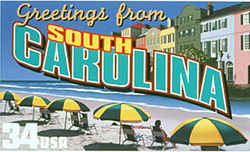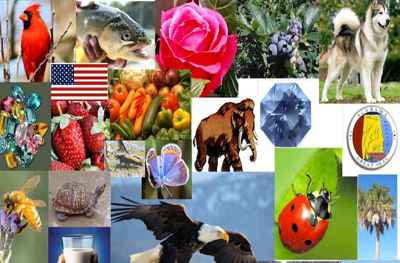
South Carolina Symbols
South Carolina State Popular Music
Beach Music

Adopted on March 27, 2001.
The General Assembly by Act No. 15, 2001 designated beach music as the official popular music of South Carolina.
It was adopted on March 27, 2001. Beach music has contributed tremendously to the enjoyment of South Carolina citizens and has become synonymous with the Shag.
South Carolina State Popular Music : Beach Music

Beach music, as it's known in the South, originated in the coastal Carolinas in the years following World War II. Hip young black and white dancers that defied segregation after World War II and gave birth to "beach music" and the Shag, South Carolina's official state music and dance. The term referred to Afro-American "race" music (later called "rhythm & blues") that could be found in South Carolina only on jukeboxes.
With the decline of big band swing prompted young white dancers to seek out alternative music. George Lineberry, one of the young white dancers
who worked for a local amusements company in Myrtle Beach until 1948, took it upon himself to install "race" records on jukeboxes in white establishments,
including the popular oceanfront pavilion in the heart of the tourist district. Lineberry chose records that he and his friends had discovered on visits
to black nightclubs. Because it was mostly heard at the beach, this exciting, hard-to-find new music genre became known to white visitors as "beach
music."
Charlie's Place, the defiant interracial Myrtle Beach nightclub where jazz met "race" music, and gutsy clubgoers risked their lives to take the dance
floor with the infamous armed assault in 1950 by the Ku Klux Klan in a violent attempt to stop the rise of the "forbidden" music.
"This was the devil's music-you just didn't listen to it in the average white Southern home," said Marion Carter, founder of Ripete Records, a "beach
music" specialty label in Elliott, South Carolina.
A tamer version of the music grew in popularity as it became associated with the popular, shag, now the state's official dance. An off-shoot, a pop
version of the R&B sound often called "bubblegum beach, " is distinguished by simplistic lyrics celebrating youthful romance, alcohol highs, and
a carefree life at the Carolina beaches. In 2001 "Beach Music" was designated South Carolina's official state music.
South Carolina Act 15
(A15, R25, H3634)
AN ACT TO AMEND THE CODE OF LAWS OF SOUTH CAROLINA, 1976, BY ADDING SECTION 1-1-689 SO AS TO PROVIDE THAT BEACH MUSIC IS DESIGNATED AS THE OFFICIAL
STATE POPULAR MUSIC OF SOUTH CAROLINA.
Be it enacted by the General Assembly of the State of South Carolina:
Findings
SECTION 1. The General Assembly finds that during this century and especially during the last fifty years, the development of beach music has contributed
tremendously to the enjoyment of the citizens of our State and has become synonymous with South Carolina and certain of its dances, including the Shag.
The General Assembly further finds that it is appropriate to recognize beach music in this manner.
Beach music designated state popular music
SECTION 2. The 1976 Code is amended by adding:
"Section 1-1-689. Beach music is designated as the official state popular music of South Carolina."
Time effective
SECTION 3. This act takes effect upon approval by the Governor.
Ratified the 21st day of March, 2001.
Approved the 27th day of March, 2001.
South Carolina Law
The law designating beach music as the official South Carolina state popular music is found in the South Carolina Code of Laws, Title 1, Chapter 1, Article 9, Section 1-1-689.
Title 1 - Administration of the Government
CHAPTER 1. GENERAL PROVISIONS
ARTICLE 9. STATE EMBLEMS, PLEDGE TO STATE FLAG, OFFICIAL OBSERVANCES
SECTION 1-1-689
SECTION 1-1-689. Official State popular music.
Beach music is designated as the official state popular music of South Carolina.
HISTORY: 2001 Act No. 15, Section 2







